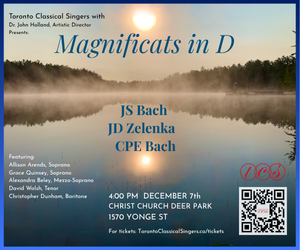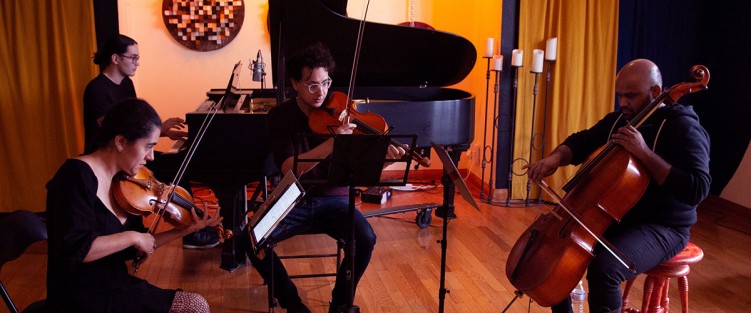 As we endure the coldest stretch of the year, anticipating the first signs of thaw around six weeks from the release of this issue, it seems that new music activity in the city is also undergoing a bit of a hibernation, with many of the typical presenters holding off until April to resurge into action. However, as I discovered while perusing the listings, there are some signs of vibrant and percolating life out there. One concert in particular caught my eye – a performance of Morton Feldman’s 80-minute work for piano and cello entitled Patterns in a Chromatic Field, performed and produced by members of Freesound on February 29 and March 1.
As we endure the coldest stretch of the year, anticipating the first signs of thaw around six weeks from the release of this issue, it seems that new music activity in the city is also undergoing a bit of a hibernation, with many of the typical presenters holding off until April to resurge into action. However, as I discovered while perusing the listings, there are some signs of vibrant and percolating life out there. One concert in particular caught my eye – a performance of Morton Feldman’s 80-minute work for piano and cello entitled Patterns in a Chromatic Field, performed and produced by members of Freesound on February 29 and March 1.
Freesound is a contemporary nine-member music collective in Toronto whose second concert in February of 2020, was presented just before the pandemic shut everything down. After a few years of video performances, Freesound returned to live performance, with its first concert post-pandemic presented in October of 2022. I spoke with the Artistic Director Paolo Griffin to learn more about the group and its activities. Griffin, the sole composer among the group, as the rest are performers, concluded his undergraduate studies at the University of Toronto, where he met most of the other collective members, as well as at the Glenn Gould School of Music. Upon returning from graduate studies in the Netherlands at The Hague, he began organizing concerts here – something he was also doing during his time away. 2023 was a particularly dynamic year, involving participation in the Women from Space Festival in March and receiving an invitation to serve as the ensemble-in-residence at Arraymusic until 2025.
True to its makeup as a collective, Freesound’s programming decisions are undertaken by all the members of the group. “We all have different people we like to work with and different ways of working. Everyone has their preference of what they’d like to program. This way you get really diverse programming,” Griffin says. The idea for the Feldman performance came from the two performers, Amahl Arulanandam (cello) and Wesley Shen (piano). One of the stated missions of Freesound is to present “revivals of landmark works from the 21st and late 20th centuries,” and Patterns in a Chromatic Field, composed in 1981, is a perfect example of this.
Feldman’s musical style is characterized by repetition and an exploration of the progression of time, with priority given to pure sound rather than structures of functional harmony. Patterns in a Chromatic Field is more busy and rhythmic than is usual in Feldman’s work, Griffin said, and is characterized by dense clusters of minor seconds and augmented fourths. Griffin has himself been influenced by Feldman’s music, directly and indirectly. He has been mentored by Canadian composer Rodney Sharman who studied with Feldman and whose program notes will be used for the upcoming performance. Griffin’s own compositions are microtonal, using “just intonation”, and many of his recent works have been in the half-hour range. He also uses repetition with gradual changes spread out over time, as is common in Feldman’s music. Presenting longer works isn’t done as often here in Canada as was his experience in Europe, he said. “I like the idea of just having one long piece that the audience can really sink its teeth into.” (Feldman’s interest in visual artists is also reflected in Griffin’s practice – his father teaches colour theory and drawing at OCAD.)
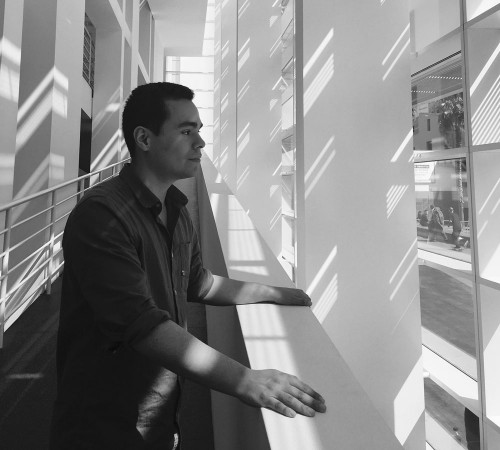 What struck me during our conversation is how much Griffin is himself part of the broader new music community. He serves on the board of Musicworks magazine, has received mentoring on art administration from Ryan Scott of Continuum (itself an organization started 39 years ago by U of T grads in composition), and is involved in co-presenting an upcoming concert on March 3 with Arraymusic of music by Rodney Sharman performed by pianist Rachel Iwaasa from Vancouver. At the time of our interview, he was busy with a residency at the Canadian Music Centre, which culminated in an open studio event on January 26 where he displayed his composer sketchbooks along with some of his father’s art.
What struck me during our conversation is how much Griffin is himself part of the broader new music community. He serves on the board of Musicworks magazine, has received mentoring on art administration from Ryan Scott of Continuum (itself an organization started 39 years ago by U of T grads in composition), and is involved in co-presenting an upcoming concert on March 3 with Arraymusic of music by Rodney Sharman performed by pianist Rachel Iwaasa from Vancouver. At the time of our interview, he was busy with a residency at the Canadian Music Centre, which culminated in an open studio event on January 26 where he displayed his composer sketchbooks along with some of his father’s art.
Future plans for the collective include the programming of notable works by Meredith Monk, Pauline Oliveros, Julius Eastman, John Cage, James Tenney and Harry Partch. Tenney is of particular interest because of his huge impact on so many of Toronto’s composers during the time he lived here and taught at York University (1976-2000). They are also dedicated to premiering new Canadian works: as Griffin said, “We like working with the same composers over and over again when we get the chance because it builds an organized artistic relationship and a spirit of collaboration.” Pieces by composers James Lowry and Michael Oesterle will be part of upcoming concerts, and a concert focused on graphic and text scores is planned for June 2024. Freesound’s performers are very skilled and imaginative at interpreting these types of pieces, Griffin said. As well, a concert of sho and accordion music will be programmed in the near future and will include a piece by Christina Volpini.
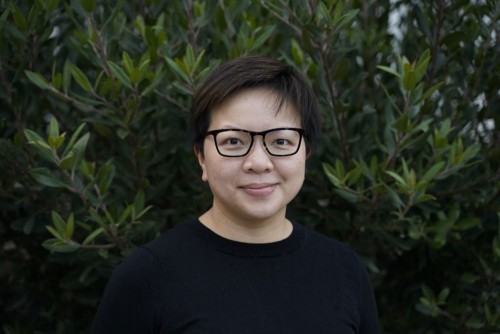 Continuum: As I mentioned above, Continuum is in the midst of their 39th season. As part of the celebrations, the fourth edition of their PIVOT mentoring program will showcase the fruits of this project with a concert on April 7, co-presented by the Canadian League of Composers and the Canadian Music Centre. This year’s participating composers include Alexander Bridger (NL), Ricardo Ferro (ON), Liberté-Anne Lymberiou (QC), Anju Singh (BC), and Janet Sit (ON). Each composer was given a chance to work with a mentor of their own choice for six months, all towards the goal of creating new works for the Continuum ensemble. Sit was also part of the Toronto Symphony’s NextGen composers program during the 2022/23 season, with each participant commissioned to write a Celebration Prelude to honour the TSO’s 100th anniversary. These activities, by creating opportunities for younger composers to receive guidance and hear their works performed, is a wonderful step towards cultivating a vibrant future for contemporary music.
Continuum: As I mentioned above, Continuum is in the midst of their 39th season. As part of the celebrations, the fourth edition of their PIVOT mentoring program will showcase the fruits of this project with a concert on April 7, co-presented by the Canadian League of Composers and the Canadian Music Centre. This year’s participating composers include Alexander Bridger (NL), Ricardo Ferro (ON), Liberté-Anne Lymberiou (QC), Anju Singh (BC), and Janet Sit (ON). Each composer was given a chance to work with a mentor of their own choice for six months, all towards the goal of creating new works for the Continuum ensemble. Sit was also part of the Toronto Symphony’s NextGen composers program during the 2022/23 season, with each participant commissioned to write a Celebration Prelude to honour the TSO’s 100th anniversary. These activities, by creating opportunities for younger composers to receive guidance and hear their works performed, is a wonderful step towards cultivating a vibrant future for contemporary music.
Toronto Symphony: In that spirit, the TSO continues to commission works from living composers, and during February there are two events of this nature. Their concerts on February 23 and 24 offer repeat performances of their 2017 commission from Kelly-Marie Murphy entitled Curiosity, Genius, and the Search for Petula Clark, a piece that blends rock and pop music elements with orchestral sound. Murphy wrote the work to celebrate Glenn Gould’s 85th birthday and the 70th anniversary of his debut performance with the TSO. It turns out that Glenn Gould was fascinated by the British pop star; his first radio documentary was called The Search for Petula Clark, created to document an experience he had driving to Northern Ontario while listening to the radio. Apparently, Petula Clark’s current hit, Who Am I? kept appearing on the various stations he was tuning into.
On February 28 and 29, the talents of the prolific Spanish composer Francisco Coll will be on display with the North American premiere of his Ciudad sin sueño (City That Does Not Sleep). This name comes from a poem in Federico García Lorca’s Poet in New York and the piece derives much of its musical inspiration from Spanish Flamenco. The piece was written as a musical portrait, at the request of his Spanish compatriot, pianist Javier Perianes.
On the TSO’s April 6 concert, there will be a performance of the Hungarian-Austrian composer György Ligeti’s Lontano alongside another North American premiere – a TSO co-commission from Samy Mousa of his Trombone Concerto performed by Jörgen van Rijen.
Ligeti: Ligeti’s music will also be featured in the March 28 concert by Esprit Orchestra with the performance of his Concerto for Violin & Orchestra (1990-92) performed by violinist Mark Fewer.
And, coming full circle, Freesound member Wesley Shen will perform Ligeti’s Continuum for solo harpsichord in their Feb. 29/Mar 1 concert). Written in 1968, the piece is made up of a series of very fast notes to create a continuous stream of sound – in part the sound the plectrum makes as it plucks the strings of the harpsichord. In keeping with the vision of the FreeSound collective to program the work of key composers of the late 20th century and the early 2000’s, these opportunities to hear the music of this innovative and influential composer will be a welcome addition to the listening menu for these upcoming wintery months.
Women From Space
Come March, the 6th edition of the annual Women from Space Festival will kick off – a three-day feast of creativity from March 8 (International Women’s Day) to March 10 at the Music Gallery. The festival brings together a wide array of gender-diverse artists, from Canada and internationally, blending music with various mixed-media forms, with the aim of celebrating and amplifying the art of visionary women working in exploratory and experimental musical traditions.
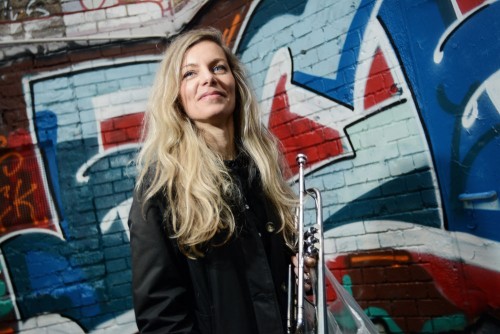 In an email exchange, WfS co-artistic director Bea Labikova revealed that festival organizers like to kick off the event by celebrating an artist who has made a significant impact on Toronto’s creative music scene. This year’s WfS gives that honour to Lina Allemano who will be appearing with her duo Bloop. The musical dialogue between Allemano and Bloop partner Mike Smith, who performs with live-processing and effects, weaves together melodies and gestures, with Allemano’s acoustic trumpet serving as the primary source material. On the same evening, the WfS Big Bang! 17-piece improvising band will play music by Björk accompanied with live visuals by The Liquid Crystal Display.
In an email exchange, WfS co-artistic director Bea Labikova revealed that festival organizers like to kick off the event by celebrating an artist who has made a significant impact on Toronto’s creative music scene. This year’s WfS gives that honour to Lina Allemano who will be appearing with her duo Bloop. The musical dialogue between Allemano and Bloop partner Mike Smith, who performs with live-processing and effects, weaves together melodies and gestures, with Allemano’s acoustic trumpet serving as the primary source material. On the same evening, the WfS Big Bang! 17-piece improvising band will play music by Björk accompanied with live visuals by The Liquid Crystal Display.
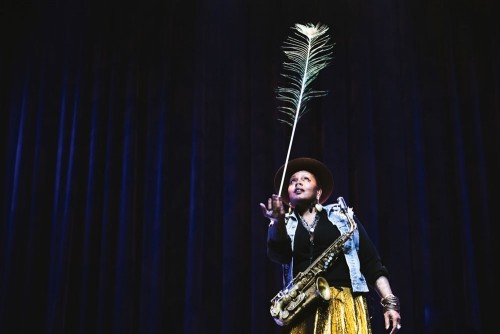 Another standout artist this year is American saxophonist Matana Roberts. Roberts skillfully combines improvisation, composition, visual art, and mixed-media to deliver their captivating performances. When asked by Labikova about potential performing collaborators for the festival, Roberts suggested either trumpeter Nicole Rampersaud or percussionist Germaine Liu, so Labikova decided to put all three of them together for the final set of the festival on March 10.
Another standout artist this year is American saxophonist Matana Roberts. Roberts skillfully combines improvisation, composition, visual art, and mixed-media to deliver their captivating performances. When asked by Labikova about potential performing collaborators for the festival, Roberts suggested either trumpeter Nicole Rampersaud or percussionist Germaine Liu, so Labikova decided to put all three of them together for the final set of the festival on March 10.
Of necessity, programming a festival of this nature evolves over time. “Over the years,” Labikova says, “our ears have sharpened for artists who are doing something fresh, unique, who are open to an adventure and who approach taking risks head-on.”
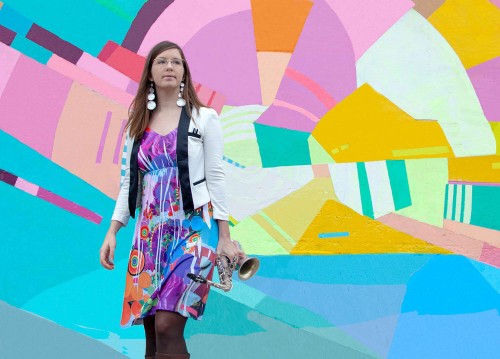 In addition to keeping attuned to the latest projects “stirring in the experimental music waters”, Labikova and fellow-director Kayla Milmine, the co-directors of the festival, are also open to receiving applications. “We are slightly biased towards one-off, unique performances,” Labikova says, “so we like to encourage artists to try something new and different.”
In addition to keeping attuned to the latest projects “stirring in the experimental music waters”, Labikova and fellow-director Kayla Milmine, the co-directors of the festival, are also open to receiving applications. “We are slightly biased towards one-off, unique performances,” Labikova says, “so we like to encourage artists to try something new and different.”
For this year’s WfS uniquely creative mix of artists, visit womenfromspace.com.
Wendalyn Bartley is a Toronto-based composer and electro-vocal sound artist. sounddreaming@gmail.com



